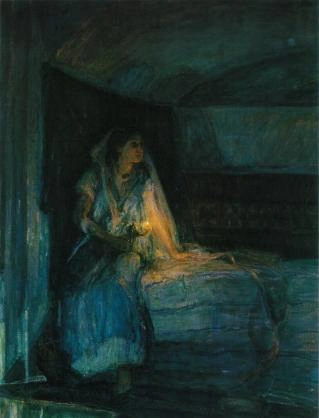1
Čovjek pozna svoju ženu Evu, a ona zače i rodi Kajina, pa reče: "Muško sam čedo stekla pomoću Jahve!"
2
Poslije rodi Abela, brata Kajinova; Abel postane stočar, a Kajin zemljoradnik.
3
I jednoga dana Kajin prinese Jahvi žrtvu od zemaljskih plodova.
4
A prinese i Abel od prvine svoje stoke, sve po izbor pretilinu. Jahve milostivo pogleda na Abela i njegovu žrtvu,
5
a na Kajina i žrtvu njegovu ni pogleda ne svrati. Stoga se Kajin veoma razljuti i lice mu se namrgodi.
6
I Jahve reče Kajinu: "Zašto si ljut? Zašto ti je lice namrgođeno?
7
Jer ako pravo radiš, vedrinom odsijevaš. A ne radiš li pravo, grijeh ti je kao zvijer na pragu što na te vreba; još mu se možeš oduprijeti."
8
Kajin pak reče svome bratu Abelu: "Hajdemo van!" I našavši se na polju, Kajin skoči na brata Abela te ga ubi.
9
Potom Jahve zapita Kajina: "Gdje ti je brat Abel?" "Ne znam", odgovori. "Zar sam ja čuvar brata svoga?"
10
Jahve nastavi: "Što si učinio? Slušaj! Krv brata tvoga iz zemlje k meni viče.
11
Stoga budi proklet na zemlji koja je rastvorila usta da proguta s ruke tvoje krv brata tvoga!
12
Obrađivat ćeš zemlju, ali ti više neće davati svoga roda. Vječni ćeš skitalica na zemlji biti!"
13
A Kajin reče Jahvi: "Kazna je moja odviše teška da se snosi.
14
Evo me tjeraš danas s plodnoga tla; moram se skrivati od tvoga lica i biti vječni lutalac na zemlji - tko me god nađe, može me ubiti."
15
A Jahve mu reče: "Ne! Nego tko ubije Kajina, sedmerostruka osveta na njemu će se izvršiti!" I Jahve stavi znak na Kajina, da ga tko, našavši ga, ne ubije.
16
Kajin ode ispred lica Jahvina u zemlju Nod, istočno od Edena, i ondje se nastani.
17
Kajin pozna svoju ženu te ona zače i rodi Henoka. Podigao je grad i grad prozvao imenom svoga sina - Henok.
18
Henoku se rodio Irad, a od Irada potekao Mehujael; od Mehujaela poteče Metušael, od Metušaela Lamek.
19
Lamek uzme dvije žene. Jedna se zvala Ada, a druga Sila.
20
Ada rodi Jabala, koji je postao praocem onih što pod šatorima žive sa stokom.
21
Bratu mu bijaše ime Jubal. On je praotac svih koji sviraju na liru i sviralu.
22
Sila rodi Tubal-Kajina, praoca onih koji kuju bakar i željezo. Tubal-Kajinovoj sestri bijaše ime Naama.
23
Lamek prozbori svojim ženama: "Ada i Sila, glas moj poslušajte! Žene Lamekove, čujte mi besjedu: Čovjeka sam ubio jer me ranio i dijete jer me udarilo.
24
Ako će Kajin biti osvećen sedmerostruko, Lamek će sedamdeset i sedam puta!"
25
Adam pozna svoju ženu te ona rodi sina i nadjenu mu ime Šet. Reče ona: "Bog mi dade drugo dijete mjesto Abela, koga ubi Kajin."
26
Šetu se rodi sin, komu on nadjenu ime Enoš. Tada se počelo zazivati ime Jahvino.







